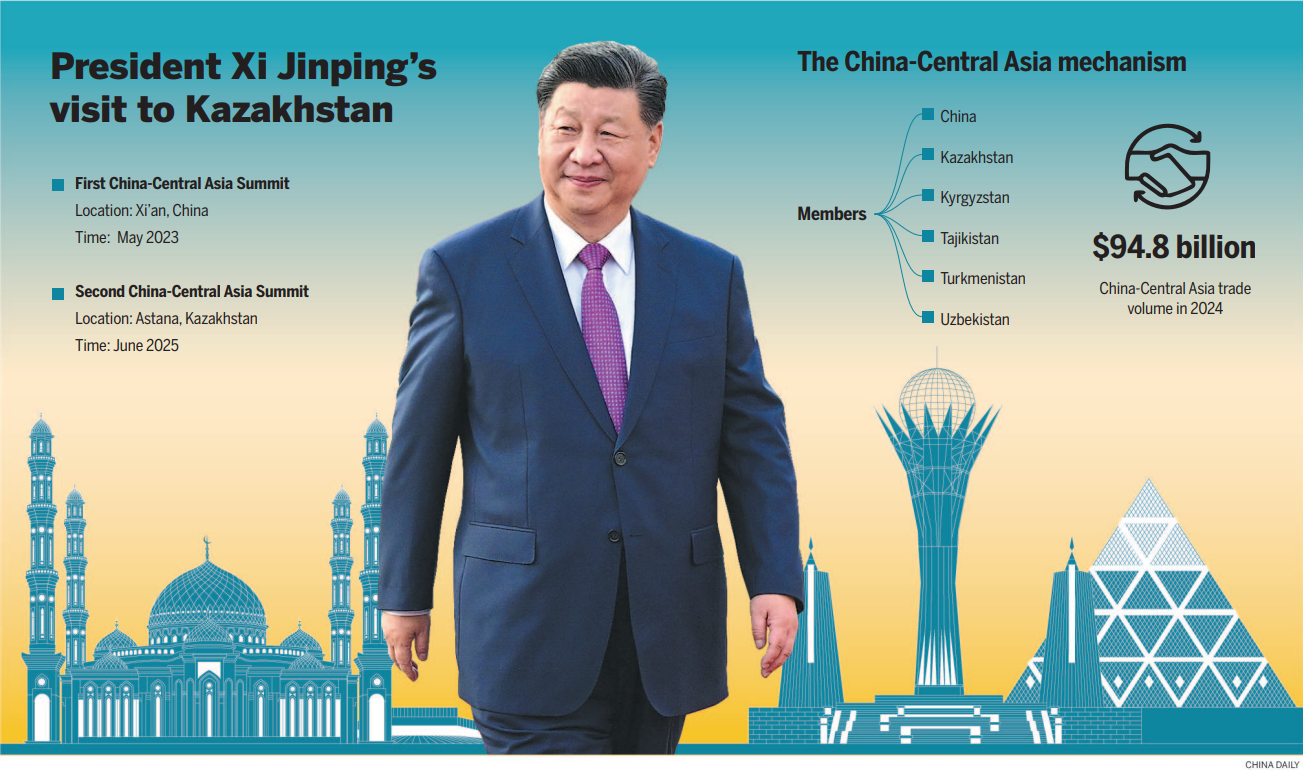Visit: Coordination on unity, stability, development stressed

As President Xi Jinping kicks off his three-day trip to Kazakhstan on Monday for the second China-Central Asia Summit in Astana, the Kazakh capital, expectations are high for much closer cooperation between the two sides in many fields, including trade, investment and security.
Amid the tariff war launched by the United States, the leaders of China, Kazakhstan, Kyrgyzstan, Tajikistan, Turkmenistan and Uzbekistan are expected to use the summit to reaffirm their commitment to upholding multilateralism and their support for rules-based international trade, observers said. The leaders are also likely to work on formulating a common position against protectionism within the framework of the China-Central Asia cooperation mechanism, they said.
Sun Weidong, secretary-general of the Secretariat of the China-Central Asia Mechanism in Xi'an, Shaanxi province, said the inaugural China-Central Asia Summit held in Xi'an in May 2023 was a milestone in friendly exchanges between China and the five Central Asian countries.
Under the guidance of the heads of state of the six countries, China-Central Asia relations have grown strongly, promising an even broader scope for collaboration in various fields, the Xi'an foreign affairs office quoted Sun as saying.
During the second summit in Astana, the heads of state of the six countries are expected to chart a new course for collaboration, Sun said. The six countries are expected to issue an Astana declaration that comprehensively summarizes the successful experiences of China-Central Asian cooperation and sign a number of documents, Sun added.
READ MORE: China, Kyrgyzstan agree to support free trade, uphold multilateralism
With the concerted efforts of all parties, the summit will contribute to world peace and stability as well as regional development and prosperity, he added.
The China-Central Asia mechanism was launched in 2020. Of the five Central Asian countries, Kazakhstan, Kyrgyzstan and Tajikistan share borders with China totaling around 3,000 kilometers in length.
Since the first China-Central Asia Summit two years ago, relations between China and the Central Asian countries have entered a new era, and Belt and Road cooperation has effectively boosted trade, cultural and people-to-people exchanges in the region.
In 2024, China's trade with Central Asia reached a record $94.8 billion, fueled in part by a booming cross-border e-commerce sector. China is Central Asia's top trading partner and a major source of investment. As of the end of 2024, China's direct investment stock in the five Central Asian countries had exceeded $17 billion in fields such as agriculture, energy and infrastructure.
Xi's attendance at the summit in Kazakhstan will be one of China's key diplomatic engagements in the first half of this year, following his state visit to the Southeast Asian countries of Vietnam, Malaysia and Cambodia, as well as his state visit to Russia, as Beijing strives to build a much closer community with a shared future with neighboring countries.
Foreign Ministry spokesman Lin Jian said on Friday that China and the five Central Asian countries will use the Astana summit to further consolidate mutual trust, build consensus on cooperation, deepen the synergy of strategies, promote the upgrading of cooperation in various fields, and inject more positive energy into building a closer China-Central Asia community with a shared future.
Important partner
Muhammad Zamir Assadi, a media fellow at the China International Press Communication Centre in Beijing, said that Central Asia's location, as a bridge linking the East and the West, has long made it an important partner for China, especially in terms of trade and investment.
With China's support, the Central Asian countries are poised to increase their exports, improve infrastructure and integrate more deeply into global supply chains, Assadi said.
Construction of the China-Kyrgyzstan-Uzbekistan railway began in December. The cross-border railway — which will start in Kashgar in Northwest China's Xinjiang Uygur autonomous region and pass through Kyrgyzstan before entering Uzbekistan — will cover about 523 kilometers, including 213 kilometers in China, according to the construction plan. The line is expected to greatly improve connectivity among the three countries, driving faster economic and social development in the region.
ALSO READ: China, Central Asia vow to uphold multilateralism
A communique of the sixth China-Central Asia Foreign Ministers' Meeting, which was held in Almaty, Kazakhstan, on April 26, said that all parties emphasized the need to enhance the status and role of Central Asia as one of the most important trans-Eurasian transportation hubs, as well as the need to strengthen collaboration on the movement of freight trains on the China-Europe route through Central Asia.
The communique also highlighted the mechanism of the China-Central Asia Summit as a key regional platform for developing coordinated approaches to issues of consolidating regional unity, ensuring stability and sustainable development, and deepening the countries' relations.
Within the framework of the China-Central Asia mechanism, ministerial-level meetings have been established for economy and trade, customs, transportation and agriculture, as well as for facilitating dialogue among political parties.
In March, Liu Jianchao, head of the International Department of the Communist Party of China Central Committee, said in a speech at the Young Experts Club, part of the Senate of Kazakhstan, "In a turbulent world, China and Central Asian countries, which have traversed a development journey of more than 30 years, have adhered to the original aspirations and moved forward with determination, continuing to build a close China-Central Asia community with a shared future."
Liu added: "With the fruitful results and successful experience of sharing interests, responsibilities and future, both sides have injected stability, certainty and positive energy into the turbulent world. This is the China-Central Asia answer we provide for the world today, and more important, it is a guide for us to move toward the future together."
Contact the writer at caodesheng@chinadaily.com.cn


